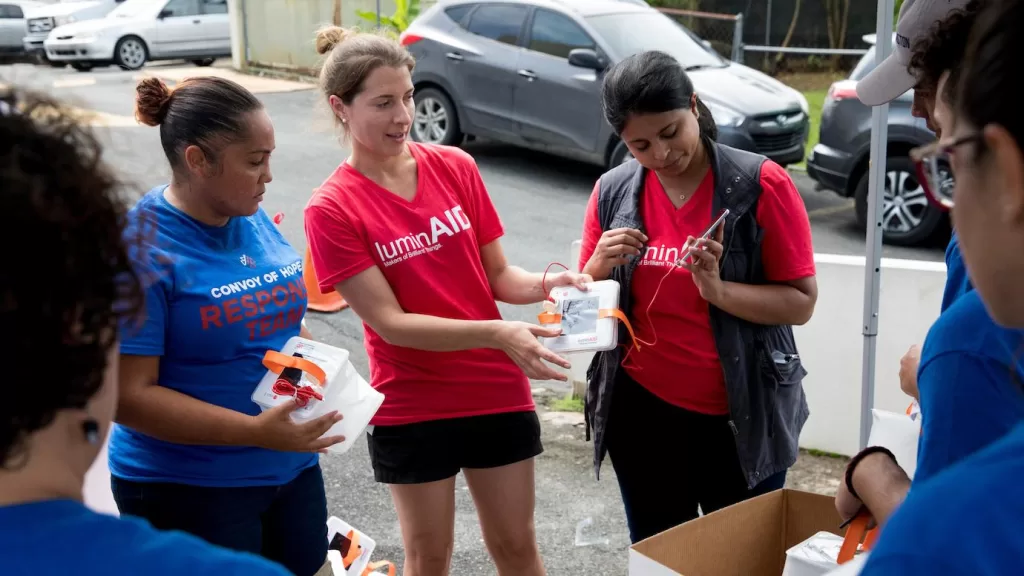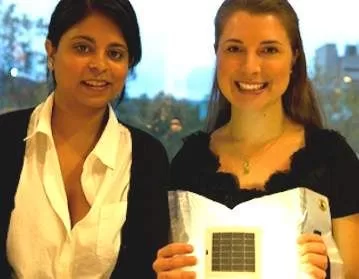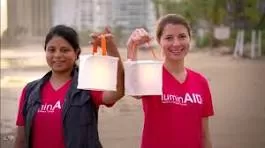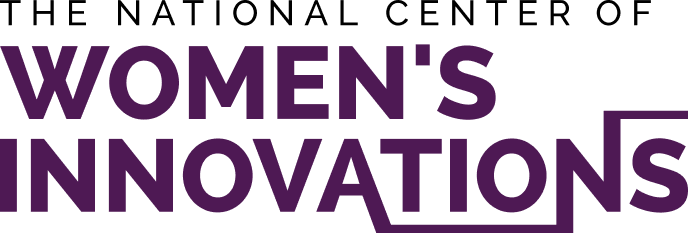Creating Light in the Darkest of Times
Anna Stork and Andrea Sreshta were students at Columbia’s Graduate School of Architecture, Planning and Preservation in 2010 when a devastating earthquake struck Haiti and their class was asked to design some novel ways to help. While most of the students came up with structural ideas involving food, shelter and water, the two women asked themselves what they could design that would really make a difference. The dangerous conditions at night in tent cities inspired them to turn their attention to another critical need: light.
The result was LuminAID, an inflatable solar lantern that could pack flat to be cost-effectively distributed after disasters. Their vision was simple: a single, rechargeable lantern that would be lightweight, easy to use, and serve as a safer alternative to hazardous candles or toxic kerosene for people without stable access to electricity. Unlike a flashlight, its diffuse light would serve as a lantern to light up a room or a tent – and it wouldn’t depend on batteries, which can be hard to find in a crisis.
The challenge was how to move their solution from brilliant concept to reality. In February 2015, the two women pitched their idea on ABC’s Shark Tank and, to their surprise, received offers from all five Sharks. They walked out of the tank with billionaire Mark Cuban as LuminAID’s first investor. What made them both unique and successful on the show was a focus on social entrepreneurship, a double bottom-line that balances making a profit with having an impact for good.
In 2016, LuminAID was granted a patent by the United States Patent Office for their lighting technology. Its latest design incorporates a way to recharge cell phones and other devices. Whether a backpacker lost in the woods or a refugee relying on their phone to find safe passage out of a war zone, the newest light gives people the ability to charge a phone anywhere.
The two founders and their dedicated staff worked with humanitarian partners across the world to send LuminAID to those in need. One of their largest strategic partners was Shelter Box, with which they began working in 2013, after a disastrous typhoon in the Philippines. They shipped thousands of solar-powered phone chargers to help Ukrainian refugees and have helped create safe spaces for women and children following disasters. Its “Give Light, Get Light” program encourages supporters to purchase a light for themselves and donate a second one to the company’s humanitarian partners to distribute to families in need.
Beyond its humanitarian benefit, the solar lights are illuminating daily life: from backyards to backpackers, from emergency kits during power outages, to nightly dog walkers and children in pillow forts. The lanterns are being sold in retail stores for outdoor and camping use. Thanks to the work of these two creative innovators, more people have access to the gift of light and connection during the darkest of times.
Anna and Andrea are featured in a book about female innovators and inventors throughout history, “Girls Think of Everything.” They serve as strong positive role models for girls interested in tech and entrepreneurship, sectors where participation for women is disproportionately low.
Note: In 2021, LuminAID was acquired by Adventure Ready Brands, a New Hampshire based maker of outdoor gear and products. Anna left the business after the acquisition; as of August 2024, Andrea was still with the company.
Awards and Accolades
- ABC’s Shark Tank funding, 2015
- First place, $100K Midwest 2013 Clean Energy Challenge
- First place, the William James Business Plan Competition
- Winner, Chicago Booth School of Business’s Edwardson Social New Venture Challenge, 2012
- Toyota Motors 2014 Mothers of Invention Award
- Anna featured in children’s book, Engineering: Cool Women Who Design
- Featured in book, Girls Think of Everything




